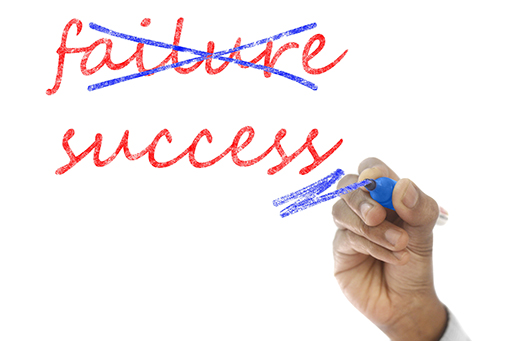4 Failure and constraints
How you cope with setbacks and how you view failure shapes the way you deal with future difficulties. By recognising that failure and learning are normal aspects of creativity and innovation you can begin to understand how people involved in creative processes might make the best of failure and consequently do better next time.
Think of it this way: sometimes you have to do things wrong before you learn how to do things right. Seeing failure as an opportunity to learn can pave the way for future success.
When a child starts to learn how to walk, they stumble and fall repeatedly until they succeed through repeated attempts and a process of adaptation and adjustment. As adults though, you tend to be extraordinarily eager to eliminate or hide errors even when learning – which overlooks an important learning opportunity: errors can teach you what not to do.

While the notion of failure might strike fear into the hearts of many, the reality is that at some point everyone fails. Whether it be a project that doesn’t quite work out, a promotion you miss out on or perhaps even a challenge that you don’t quite manage to overcome, failure is an inevitable part of life.
Yet for both leaders and organisations, the real challenge lies not in avoiding failure but in ensuring that when failure does occur it is managed intelligently and that lessons – positive, negative and otherwise – are learned. Because after all, failure is a critical part of eventual success and innovation. As Steve Levitt of Freakonomics argues:
To be willing to accept failure, you have to have self-confidence... you have to be accepting of the idea that failing isn’t, doesn’t define who you are. Failing gets something out of the way that keeps you from finding the thing that you’re actually going to be good at.
Activity 5 Have you ever failed?
Take a moment to reflect on a time when you have failed. What were you able to learn from this experience and how has this helped you in future situations?
Discussion
Have you ever failed? Chances are that you have, or at least that things have not always worked out precisely as you had intended. The key is not to avoid failure but rather to make it manageable and to learn from it.
The renowned inventor of the cyclonic vacuum, James Dyson, once remarked that ‘I built 5127 prototypes before I got it right’ (Raz 2018). While in each case Dyson might arguably have failed, by taking measured incremental steps and learning from each one he was eventually able to perfect his innovative new vacuum cleaner.
